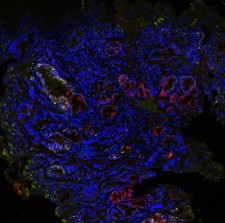Cernostics Announces Blinded, Independent Validation of TissueCypher(R) Performance for Predicting Risk of Progression to Esophageal Cancer in Patients With Non-Dysplastic BE

PITTSBURGH, June 25, 2020 (Newswire.com) - Cernostics, a leader in the development of AI-driven image analysis technologies for precision medicine testing, today announced publication of new clinical results demonstrating further validation of how its TissueCypher(R) diagnostic test predicts future disease progression in patients with Barrett's Esophagus (BE). (Abstract available here. Full article available via journal subscription.) By identifying "at-risk" patients much earlier than traditional methods, TissueCypher provides actionable results that allow physicians to target early therapeutic interventions to prevent cancer.
TissueCypher is the first and only precision medicine test designed, developed, and commercialized to predict which patients with Barrett's Esophagus will progress to high-grade dysplasia (HGD) or esophageal adenocarcinoma (EAC).
In this study, funded by the NIH/NCI, patients with BE who progressed to HGD or EAC after at least one year following endoscopy (n=58) were matched to patients with BE without disease progression after a median of seven years surveillance (n=210). Results demonstrated that patients classified as high-risk by TissueCypher® were at 4.7-fold increased risk for HGD/EAC compared to those classified as low-risk (p<0.0001). Furthermore, this study demonstrated that patients with non-dysplastic BE who TissueCypher scored high-risk progressed to HGD or EAC at a rate of more than 5%/year, which is at least a 10-fold increase in reported progression rates for NDBE, based on large population studies.
In an editorial accompanying the published results, Prasad G. Iyer, MD, MSc, at Mayo Clinic in Rochester, Minnesota, describes TissueCypher as the potential "Holy Grail" for Barrett’s Esophagus. "Identification of those at higher risk may allow either intensive endoscopic surveillance (to detect incident dysplasia/EAC) or proactive EET, whereas surveillance intervals could be lengthened in those at low risk. This risk prediction has been referred to as the 'Holy Grail' in BE."
"This is the third independent study showing that TissueCypher gives physicians crucial predictive power beyond expert diagnosis, especially in that difficult subset of patients whose true risk may go unnoticed if we rely solely on traditional methods," said lead author Jon M. Davison, MD, Associate Professor of Pathology at University of Pittsburgh in Pittsburgh, Pennsylvania.
TissueCypher's unique advantages stem from its patented, AI-based digital platform with multi-channel fluorescence imaging that provides physicians with a more in-depth, accurate, and comprehensive view of each patient's unique pathology.
"The TissueCypher image analysis platform simultaneously and objectively extracts protein expression information from multiple biomarkers, as well as provides a digital expression of tissue architecture and nuclear morphology," says Vani J.A. Konda, MD, Clinical Director, Center for Esophageal Diseases, at Baylor University Medical Center in Dallas, Texas, and a key opinion leader in the use of imaging and novel screening techniques to improve early detection and treatment. "The information physicians receive is meaningful, accurate, and immediately actionable." Dr. Konda has published extensively on the role of biomarkers for improving risk stratification in patients with Barrett's Esophagus, including an upcoming review paper in the July 2020 issue of Gastroenterology & Endoscopy News.
Cernostics' innovative technology is unique in today's market because tissue structure is preserved while immune, stromal, stem cell and tumor biomarkers are analyzed – all of which is done by evaluation of standard esophageal pinch biopsies readily available from the endoscopy procedure. Biomarker intensity and spatial relationships within the tissue structure are also analyzed and reported, creating an in-depth picture of the patient's risk from which the physician can create successful patient management protocols.
TissueCypher has been tested and validated in five independent clinical studies at leading centers around the world, including Cleveland Clinic, University of Pennsylvania Medical Center, Geisinger Health, and Academic Medical Center in Amsterdam. Most recent peer-reviewed results are published currently in the June 2020 issue of the American Journal of Gastroenterology.
Using a pinch biopsy specimen routinely collected by the gastroenterologist during an endoscopy procedure, TissueCypher is easily incorporated into a physician's current practice. The test requires no additional tools or collection devices, as are needed with other currently available diagnostic options.
About Barrett's Esophagus
Barrett’s Esophagus (BE) affects more than three million Americans, occurring when chronic exposure to stomach acid causes the esophageal cell lining to deteriorate and undergo changes that can create an environment for cancer. Without treatment, Barrett’s can lead to EC, with a poor five-year survival of less than 20%. Today, Barrett’s is commonly managed by surveillance, involving regular endoscopic procedures with biopsy, monitoring disease progression, and GERD-related drug therapy to control symptoms and prevent esophageal injury.
About Cernostics
Cernostics, a leader in tissue-based diagnostic testing, provides diagnostic tests with deeper tissue insights, better patient outcomes, and lower cost of care. Cernostics’ mission is to quantify the tissue system complexity, providing physicians and patients with individualized, actionable information to improve outcomes and reduce the incidence and mortality of cancer. For a complete listing of Cernostics’ published patents, visit www.cernostics.com/IP.
Media Contact:
Lisa Bichsel
Cernostics
Tel: +1 719-640-5640
Email: lbichsel@cernostics.com
Source: Cernostics, Inc.
